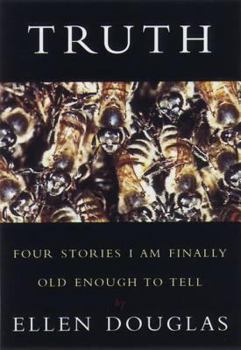Truth: Four Stories I Am Finally Old Enough to Tell
Select Format
Select Condition 
Book Overview
In four haunting family stories, Ellen Douglas seeks to track down the truth--about herself, about her white Mississippi forebears, about their relationships to black Mississippians, and ultimately about their guilt as murderers of helpless slaves. Progressively searching further and further back in time, each of these four family tales involves collusion and secrets. In Grant, a randy old uncle dying in the author's house is nursed by a beautiful black woman while his white family watches from a respectful distance. Who loves him better? When truth is death, who is braver facing it? In Julia and Nellie, very close cousins make a marriage in all but name back in the days of easy scandal. The nature of the liaison never mentioned, the family waives its Presbyterian morality in the face of family deviance. In Hampton, her grandmother's servant, who has constructed a world closed to whites, evades the author's tentative efforts at a meeting of minds. And finally, in On Second Creek, Douglas confronts her obsession with the long-lost--or -buried--facts of the examination and execution of slaves who may or may not have plotted an uprising. Having published fiction for four decades, here she crosses over into the mirror world of historical fact. It's a book, she says, about remembering and forgetting, seeing and ignoring, lying and truth-telling. It's about secrets, judgments, threats, danger, and willful amnesia. It's about the truth in fiction and the fiction in truth. Praise for Ellen Douglas: It's possible to think that some people were simply born to write. Ellen Douglas is just such a writer.--Richard Ford; Proust wrote in one of his last letters, 'one must never be afraid of going too far, for the truth is beyond.' Ellen Douglas has taken this very much to heart and has sought the truth in a region beyond falsehood; through falsehood, in effect. It's a fascinating performance.--Shelby Foote.
Format:Hardcover
Language:English
ISBN:1565122143
ISBN13:9781565122147
Release Date:January 1998
Publisher:Algonquin Books
Length:221 Pages
Weight:0.75 lbs.
Dimensions:1.0" x 5.3" x 7.4"
Customer Reviews
2 ratings
Eloquent and wise
Published by Thriftbooks.com User , 21 years ago
Ellen Douglas has crafted a memoir of sorts. This book is not so much the story of her life, but the story of the lives that came before - she probes the stories which have come down to her as "family folklore" and tries to make sense of it all. She doesn't always get right to the factual answer in each situation, but she describes her journey beautifully. For example, she talks about the illicit relationship between her grandmother's dear friend and a married distant cousin. As she writes, she makes observations regarding her recollections of these people as well as what others have told her about them. Without coming sharply and directly to the point, she send readers meandering through the collective memory of her family. It is beautifully done and the characters are made more rich because of it. In this book, Douglas does an excellent job of showing(not telling) the reader what the world was like in the Mississippi of her past. It is the perfect thoughtful book for a languid summer.
Why do so few people read this woman?
Published by Thriftbooks.com User , 23 years ago
There's little I can add to the oddly perceptive blurb above, save that reading this is like having a conversation with someone wise, sensitive, and extremely thoughtful. It's quite straightforward, but still forces you to read slowly, simply because the words seem so carefully chosen. She fits more meaning into a sentence than many writers fit into --- well, pick any number of pages, chapters, volumes, etc.... It's aptly named, too. It really does seem like she's gotten as close to the truth as possible even while she's set that up as her impossible task - certainly she's presenting the truth about SOMETHING in an extremely fair and eloquent way. A pleasure to read....






